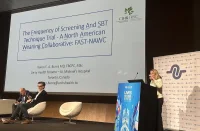The ESICM Green Paper on sustainability was launched at #LIVES2024 in Barcelona, providing a roadmap for reducing the ICU’s footprint while maintaining top care.
The healthcare sector, particularly ICUs, significantly impacts the environment due to its high energy consumption, waste generation, and reliance on single-use devices. With climate change posing a growing threat to global health, there is an urgent need for healthcare systems to become more sustainable. This involves reducing greenhouse gas emissions by 80-90% by 2050.
The European Society of Intensive Care Medicine (ESICM) is leading efforts to integrate eco-friendly practices without compromising patient care. Surveys indicate that while most patients prioritise quality care, many are open to more sustainable healthcare solutions. ESICM’s Green Paper outlines strategies to reduce the environmental impact of ICU operations while maintaining or improving patient outcomes, underscoring the link between environmental and human health.
The ESICM Executive Committee established a multidisciplinary task force composed of experts with relevant experience. They identified key areas for action based on personal experience, literature, and survey feedback. These actions were categorised into three tiers: Tier 1 (easy to implement), Tier 2 (moderate investment needed), and Tier 3 (high-impact but requiring significant investment and long-term planning).
The ESICM Green Paper has multiple objectives to promote sustainable practices in intensive care. These include:
- Evaluating the impact of climate change on ICUs and preparing for its effects on patient care and resources.
- Describing the environmental footprint of ICUs to identify key areas for reducing carbon emissions, waste, and resource use.
- Developing a framework for sustainability initiatives in ICU care to achieve environmental and health benefits.
- Proposing policies to support sustainability research and innovation in ICUs.
- Raising awareness and educating ICU healthcare professionals (HCPs) on the importance of sustainability.
- Recommending strategies for educating HCPs on their role in sustainability efforts.
- Promoting sustainability within ESICM’s operations.
The environmental impact of ICUs is a significant concern. ICUs contribute heavily to ecological damage through their high use of clinical supplies, water, and energy. The increase in single-use items, initially adopted for infection control, has led to substantial waste, and recent guidance questions their necessity in routine care. ICUs also consume vast amounts of energy, primarily for heating, ventilation, and cooling (HVAC). Water conservation is another critical yet often overlooked area. Hospitals consume significant amounts of water in patient care, sterilisation, and procedures like dialysis.
The ESICM Environmental Sustainability Task Force emphasises reducing the environmental impact of clinical and experimental research in intensive care. Key strategies include:
- Promoting digitalisation in clinical trials to minimise carbon emissions, utilising digital health tools, remote patient monitoring, and digital biomarkers. Though AI’s energy consumption is high, selective use is encouraged.
- Supporting experimental research through virtual simulations and computational modelling to reduce physical resource use and waste. Sustainable laboratory practices, like energy-efficient equipment and proper waste management, are also advocated.
- Developing guidelines and tools for measuring the environmental impact of research, including standardising Life Cycle Assessments (LCA) and Material Flow Analysis (MFA).
- Incorporating sustainability into ESICM research pathways, such as introducing an Environmental Sustainability Award and requiring environmental sustainability analysis in research applications.
- Creating a core outcome set (COS) for environmental sustainability (COS-ES) to standardise and enhance comparability of research.
- Establishing the ESICM Environmental Sustainability Research Group to monitor progress, facilitate international collaboration, and compile data on ICU environmental impact.
The ESICM Task Force emphasises integrating environmental sustainability into educational efforts. Raising awareness is a shared responsibility across all stakeholders, including healthcare professionals, patients, suppliers, and policymakers. Every aspect of ICU care is considered a potential opportunity for sustainability improvements.
Achieving environmental sustainability in healthcare requires a global approach that is adaptable to the varied resources of different systems. Resource-limited settings face unique challenges, such as high costs of sustainable technologies, poor waste management, and budget constraints that prioritise immediate care over long-term sustainability. Despite this, healthcare professionals in these settings often develop creative, efficient, low-cost solutions that could benefit resource-rich environments.
The ESICM Task Force emphasises the need for collaboration and knowledge-sharing between resource-rich and resource-limited healthcare systems. Flexible strategies should be developed to meet local needs, and ESICM, through its educational platform, can support capacity-building efforts in sustainability practices globally.
Source: #LIVES2024; Intensive Care Medicine
Image Credit: #LIVES2024
References:
De Waele JJ, Hunfeld N, Baid H et al. (2024) Environmental sustainability in intensive care: the path forward. An ESICM Green Paper. Intensive Care Med.







